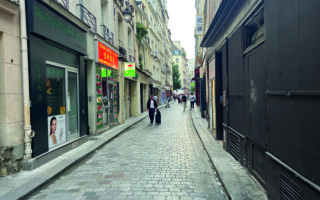Buying a Second-Hand Car in France
Essential Reading

Buying a second-hand car in France (voiture d’occasion) is a relatively straightforward process, and you will find many options to choose from. From searching for cars to the necessary paperwork—here’s what you need to know.
How Much is a Used Car in France?
Prices for used cars in France do tend to be more expensive than those on sale in the UK or United States, so it’s worth doing some research before setting your budget. At the entry-level, you are unlikely to pick up anything in good condition for lower than €1,000, while newer models with just a few years on the road, often sell for very close to the price of a new purchase.
This is largely because there is far less turnover of second-hand vehicles. Few employees use company cars and public transport is generally cheaper than in many other countries. The standards for inspection on used cars is also high, pushing prices up. This is good news, however, for those selling a car in France, as your vehicle is likely to hold its value much longer.
However, some bargains can be found, particularly on older vehicles or if you opt to go through a private seller.
To get an idea of prices, a good place to start is by searching the car-buying bible called L’Argus. Prices listed here are seen as industry standard – it’s also used by insurance companies when processing claims and premiums – and the buyer should really aim to pay within 10% of any vehicle price listed therein.
Another thing to keep in mind is the type of car you are searching for. It’s no surprise that many French drivers are loyal to the big French brands such as Renault, Citroën and Peugeot. Japanese brands, as well as German brands VW and Audi, are popular too, but it’s with the French brands that you are likely to find the most choice and the best deal, not just for the initial purchase but also for future repairs and parts.
Where to Find a Second-Hand Car in France
While there are many private sellers online, the safest bet is to go through a garage or dealer. This makes it easier to check all the required paperwork and the transaction is generally quick and straightforward. You can be assured that the car will be sold with an up-to-date controle technique and that the paperwork is all in order.
Another advantage of buying through a used car dealer is that a warranty will be offered – typically of three to six months, but sometimes up to 12 months if desired.
When buying through a dealer, there is also the possibility of a part exchange or trade if you have another car to sell. This is called a ‘reprise’ and many advertisements will state whether or not it is a possibility. If it’s not mentioned, it’s always worth asking.
The most popular way to find used cars online is via website listings and the following are some of the most reputable sites:
Most sites allow you to search by make (marque), model (modèle), price (prix), mileage (kilométrage), and engine/petrol type (carburant), as well as by region and locality. Announcements should always make it clear whether it is a professional dealer or a private seller too.
It’s generally recommended to book an appointment before going to visit a car at a dealer. Not only will this ensure the vehicle in question is still available (announcements are sometimes left up for 24 hours after a sale), but it will ensure that it is actually on-site. Sometimes dealers do not have the car available to test drive on the same day.
If you’re searching for a used car, it’s also a good idea to do a tour of the garages and dealers in your area. Even if you don’t find anything you like, be sure to leave your phone number and details of what you’re looking for and your budget. If you’re ready to buy, they will often let you know of a possible match before putting up an announcement.
Purchasing a Used Car in France: What You Need
When purchasing a used car in France, there are several documents that both parties need to provide. The seller is responsible for providing the certificat d’immatriculation, or car registration, also known as the Carte Grise, and the controle technique, or roadworthy certificate (MOT in the UK).
When you make the purchase, you will need to transfer the registration of the Carte Grise into your name. If you’re buying privately, this will be your responsibility and it can be done online here. You must ensure that the seller has correctly filled in the sale of the vehicle section (la cession d’un véhicule) and that they have declared the sale online. They will then provide you with the necessary code (code de cession) that you will use to register the car in your name. Be sure that you have both the code and the signed document before you leave with your new purchase.
If you are purchasing the car through a dealer, this transfer of registration will be done at the time of the purchase.
Note that there is a charge to transfer the carte grise (regardless of whether you buy privately or through a dealer). Registration fees vary depending on the region, type of car, and CO2 emissions, but it’s not unusual for it to be €200 or more, so be aware if you’re on a tight budget and ask the dealer to let find out the price before you sign.
To register the vehicle, you will need the following documents:
- Identification (your passport or identity card)
- Proof of residence (typically a utility bill or rental receipt, less than six months old).
- A copy of the Certificat d’immatriculation/Carte Grise with the appropriate section filled in.
- The contrôle technique (CT) certificate.
You will then make the purchase, typically via card or cheque (some dealers may not accept cheques), and sign the sales documents (expect to sign several documents, as is typical for any sale in France).
If you plan to drive your car away that day, you may also be asked for a copy of your car insurance certificate. Most car insurance companies will provide a provisional certificate for a new purchase—you will then need to finalise the details and provide them with a copy of the Carte Grise when it arrives.
Second-Hand Car in France: Your Documents
When you complete the purchase of your new car, along with the sales receipt, you will receive the following documents:
Carte Grise
Once the transfer of registration has gone through, you will receive a provisional card immediately. This is valid for a month, and the permanent card should arrive soon after in the post. This registration certificate must be finalised within a month of buying a car and must be carried in the car at all times. There is the possibility of a 750 euro fine for failure to produce this document on request.
Controle technique
The controle technique, or roadworthy test, must be done every two years in France. When buying a used car, check that the Controle Technique has been completed within six months prior to your purchase—legally, this is the seller’s responsibility. Proof of the controle technique must be displayed via a sticker on the windscreen. It is standard for a dealer to undertake the controle technique (and any necessary work needed for it to pass) once you have agreed to the purchase of the vehicle, so do not be alarmed if they do not have it immediately to hand. It will always be completed prior to the sale.
Congratulations on Your New Car!
As a car owner in France, be sure to have your certificate d’immatriculation, controle technique and proof of insurance in the car with you at all times, as well as the safety kit required under French law, which includes high visibility vests and a warning triangle.
Driving in France
Whether you own a car in France, travel to France in your UK or EU-registered car, or hire a rental car – FrenchEntrée has all the need-to-know info about driving in France. Our Essential Reading articles will take you through buying, registering, and insuring your car, as well as offering tips and advice on driving and car ownership in France.
Share to: Facebook Twitter LinkedIn Email
By Jane Wilson
Leave a reply
Your email address will not be published. Required fields are marked *




REPLY